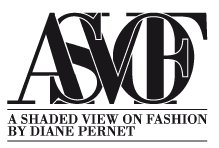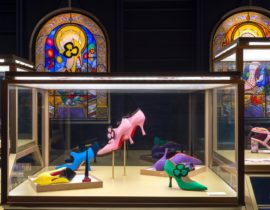Dear Diane and a shaded view on fashioners,
I just had the pleasure of dialoguing with Kadenze co-founder, Professor Ajay Kapur, who's doing incredible work in the area of creative online learning, including connecting the dots between code and creativity to empower larger areas of the population to get out there and learn, no matter where you are, what your income bracket or how old you are, here's the dialogue from tonight-
Ajay- I spent 15 years working very closely in the NIME comunity, (New Interfaces for Musical Expression) and building musical robots that can interact with humans, including building a machine orchestra. I think I have 35 megatronic instruments by now, and i've played some really amazing shows with those inventions, it was all about this experience, the symbiotic relationship between humans and machines but in a creative space. It's been amazing, working and learning with all the colleagues from all over the world, like with Rebecca Fiebrink, learning machine learning, plus incredible signal processing people at Stanford. I went to Princeton with Perry Cook, learning all of this stuff and now to have the chance to really put it together has been amazing and it really help set me and my team up for building kadenze, because we had already been doing so much work on learning and analysing whats happening in a creative space, from a human so that a machine could respond, it used to be with a robotic response but now its really feedback and how can you analyse creative work and give feedback to students.
Alex – Its inspiring what you're doing Ajay, I'm an artist researcher myself and participated in a couple of Kadenze courses already and seeing the way that you've introduced this new form of digital art education is pretty amazing, can you tell me a bit about your mission with Kadenze?
Ajay-The main problem I'm seeing is that…..you know i've been a Professor at California Institute of the Arts in LA, it's an amazing school and place where all these creative people come together, and really say "screw you to the world" and "lets just be artists and create what ever we want" and it's such an amazing community, like many creative universities, but the problem is that the cost of tuition continues to go up and its not just in one school, its in all schools. It's one thing for someone who's studying business, someone who's studying to be an engineer or a medical doctor, to have these really high tuition rates and maybe that's ok and we can have a separate discussion about that, but there's a payment track after, a path monitarily for those students afterwards, but people in the performing arts and people who go to art schools in general, that is just debilitating, it makes no sense and there's a huge problem there. At my school my job is to find the best artists in the world and bring them to campus and at a certain point, with these price tags, its like "ok, so you mean the richest students in the world" and that makes no sense, that's not a healthy environment to create a great experience. Really, the first thing we wanted to do with Kadenze, because this is a global problem, it's horrible in the US, but its also getting expensive everywhere, it's not just the US, it's a global problem….the thing is, if we unite these top artists and top universities with the mission together that we are going to come up with a solution together that deals with this financial issue and this idea of access and also together with one voice, explain to the world, why it's important to be creative, why people should be persuing these type of creative degrees, rather than just doing business or engineering, actually, this is the new engineering, this is what the world needs, this is what businesses need, these are the people who are leaders in different companies. People who know how to think and people who know how to do creative things, including coding, are the innovators who are actually leading these companies. Collectively, with all these partners, we can actually have a very strong message to the world and that's really our goal.
Alex-We hear the word innovation meantioned a lot by universites, governments and industry, but a lot of times that type of innovation is to do with industries' concept of superficial creative newness valued on monitary structures, which has very little to do with real creative risk taking, free exploration and discovery and sometimes i think that this is missing in the current university set ups, that base themselves on so called innovation… that first initial free experimental period is missing, where one learns new skills, crafts (including coding) making mistakes and experimenting in a collective environment with other like minded students, comparable to the foundational year that was taught at Bauhaus, the universities are too fast to say go innovate and now go out and start a start up, write a business plan and sell something. I'm seeing what you're doing is about empowering artists (who may have a lower income bracket or be living in a remote area) with this knowledge of coding, building their own creative systems via programming languages, editing music, learning fashion design, wearable tech, e-textiles, how to use ardunio per se and just experimenting with it, communicating with peers and growing through an interactive, global shared learning experience. Many artists out there in the real world don't know how to code, like me, i'm learning to code and i'm finding it incredibly empowering from the perspective that, sure you're an artist but having the knowledge of how to creatively code, it gives you this new skill, a craft and through exploring that craft, you make mistakes or you arrive at points within the creative process that maybe you wouldn't have reached if you didn't know how to code.
Ajay-Absolutely, i feel things that can be taught really well over an online platform include : technical skills, theoretical skills and historical and what makes an educated artist is having that perspective, it's not just the ability to create, its understanding the history of a particular field, where things got to and where it is now and how your voice sits into whats going on now. Having all these new tools, that are constantly developing and working out how sometimes we forget, like learning coding is one thing and learning coding in a creative way is very different and how you can use it as a paintbrush as a medium that you can use, that's a very different thing and everyone should learn that and everyone can learn it. All these amazing global initiatives that have happened over the last 10 -15 years with bringing languages like processing p5, chuck, super collider, there's all these incredible languages that are built for creatives, its amazing and being able to give that perspective to others is great, i mean look at all these things and here are actually the people who made them and learn from them, lets give access, we don't have to hide them behind Stanford, UCLA, all these schools that hold them behind these high barrier tuition walls, its like the world should have access to them and as a way of learning and then move on from there.
Alex- So now that the Kadenze platform is up and running it's definitely breaking down those barriers like….if you have enough money you can go to study at Stanford or Central St Martins, which was actually the place where elements of the punk movement grew out of via Malcolm Mclarren and other key artists, who didn't have to pay expensive fees and students were actually given scholarships to go to Art Schools in London 40 years ago, which is radically different now, but I also see what you're doing is venturing beyond boarders as well, because it means that people in Vanuatu or Abijan, Africa also have the possibilty to study and carry out life long learning just by having access to the internet and a computer.
Ajay-Absolutely, yes and its amazing because the students are coming from all over the world, it's fascinating, we're seeing students coming from 175 countries to take Kadenze courses, you know maybe those students will never go to an established institution, will never go to London or ever come to the US, but why should that stop them from being part of it and learning online. What's really interesting too is that in 2010, only 3% of the worlds population went to college, that is crazy, that makes no sense, it's what causes a lot of problems in the world, thats why we get corrupt dictatorships and things like that, education is the key, if people are more educated, we'll solve our own problems ourselves locally. The online movement is working hard to change the current situation, i think there are some amazing platforms that are focussing on maths, engineering and things like this, we felt that the arts are equally important and that is where we wanted to contribute, look, everyone needs to be creative as well and then people will actually innovate and solve the problems that we're having locally all over the world.
Alex-I think its so inspiring what you're doing and bringing this knowledge outside of the ivory tower, well, you're making it accessible to many. What's your view on Aron Schwartz and the system of academic publications that are locked away for the very few, in a way i feel like what you're doing is somehow connected to what happened back then. The knowledge being shared via Kadenze is new and i'm assuming its also a new form of democratic open source publishing?
Ajay-I think that this is a new publishing model…..So its really interesting, when i created my first online class, i was also working at the same time on publishing a book and they went hand in hand, i was writing what i was doing with my collaborators and then preparing scripts to actually film for class, and then i realised, wow, they're basically the same thing. The difference is that the book went out (and that's awesome) but what's amazing about the class is that it's like a living, breathing thing that people can access online, on their phones and you actually hear the person talking and it's interactive, you get questions popped up in the videos as you're going, you actually have to go and do the assignments, you share the assignment with the world, other students are commenting on it, it's like, you can't get that experience with a book. The book is done, its flat, that's it and this new model it's really incredible and it's revoloutionised what's possible because for example, at Cal Arts when we put out this course, it was incredible to see the number of people applying to the program, who now have access because its free, to this information, it's like people applying actually did the final assignment and submitted the final assignment as part of their portfolio to get into the school, it's like this is unbelievable and people are coming from all over the world, who'd never heard of Cal Arts started coming because of the online course. We all know that as budgets get cut, the first thing to go is arts and music, so people's portfolios make no sense anymore, to be honest, whereas now, they're seeing what we're teaching in the first year on campus, which is freely available online, even if you don't come, that's cool, but it's open to the public, but those who do decide to come to have the premium experience on campus, they're coming more prepared, having had the online educational experience first, this allows us to do more with the students and i've had to add things to my classes on campus because the students are now smarter, its like we can go so much faster, it's like grad school is dripping into undergrad at a faster pace, it's unbelievable. It's all because of this publication model. It's funny, because some schools are scared, fearing online education will ruin the campus, actually it's going to turn campus into what we wanted it to be, no more of this nonsense, we'll have the top students from around the world, there aren't enough places in our universities globally to fit all the students that want to learn, it's crazy and this is just the beginning and it's amazing. I'm excited for this to happen to our partner schools and professors and for them to have similar stories, because its really incredible.
Alex- I'm totally with you on that, i'm just wondering, If there are so many students that can't fit into the current number of schools, are you thinking that you'll impact the universities in getting them to create online/offline or physical/virtual learning spaces, that you can actually have students over in New Zealand, the pacific, madagascar or where ever, that they can also join in these classes, but you will still have the physical experience, but go towards offering the whole course, a degree course?
Ajay-yes, I think we're doing that at a course level now, what's going to be exciting is how we do it at a degree level, and how we shift schools that think that way for an entire degree, so that people can start doing those things and as you get more personal and one on one with the teacher, it gets more expensive for the school and there are costs that need to come in place, but with online learning it can be done at like 10% of the price!
Alex- I congratulate you, i believe you're revolutionising and democratising digital art school education and also what this means today and growing who it can impact.
Ajay-It's not just us, our partners have been incredbly supportive and all the partner universities, i think we have a dream team, there's a lot more schools coming and we're almost done with the contracts with a number of new schools, which we're really exciting about. Its just the beginning of something and I'm super excited!
There's a new fashion course starting next week:
https://www.kadenze.com/courses/fashion-style-icons-and-designing-from-historical-elements/info
And one coming later in the year from Paris College of Art:
https://www.kadenze.com/courses/60-years-of-french-fashion/info




